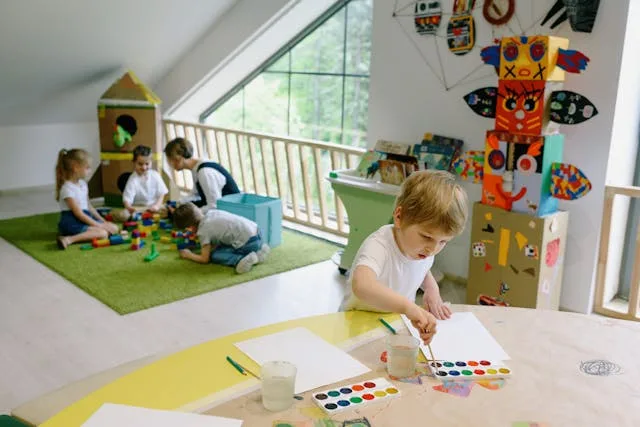Shedding Some Light On Homeschooling Misconceptions
I was recently asked why I homeschool and what possible advantages I gain by doing so. I quickly responded, “For me, there is no advantage. It would be a lot easier to send them to school. But I don’t do it for myself. I do it for my kids.” I realized that most people don’t know what homeschooling looks like and how it goes a lot further than just teaching your kids how to read and write.
The misconceptions about homeschooling
- Homeschooled children lack socialization opportunities and may struggle to interact with peers.
- Homeschooling provides subpar academic education compared to traditional schooling.
- Only highly educated or certified parents can homeschool effectively.
- Homeschooled children are isolated from the outside world and lack exposure to diverse perspectives.
- Homeschooling lacks structure and discipline, leading to disorganized learning environments.
We get these statements often from friends and family members who don’t witness the day-to-day process. so let’s dive into the world of homeschooling and shed some light on these misconceptions.
Socialization:
Homeschooled children often have ample opportunities for socialization through community groups, extracurricular activities, sports teams, and co-op classes. Many homeschooling families actively seek out social opportunities to ensure their children have diverse interactions.
My daughters, for example, have made friends through a homeschooling group that we are members of on Facebook. They are also involved in a writing club with other homeschooling families. My sons participate in a hockey group that gathers at the local arena once a week. Additionally, my oldest son and one of my daughters attend a youth group with friends who do not homeschool. Once a month, they engage in outdoor survival activities with peers of their age. They also attend a week-long summer camp.
Not only do they get to form bonds with others, but because they spend so much time together, they are also unknowingly strengthening their relationships with each other. At ages 16, 14, 14, and 10, it’s not always idyllic, but for the most part, they get along just fine.

Academic Quality:
Homeschooling can offer a high-quality education tailored to individual learning styles and needs. With personalized attention and flexibility, homeschoolers often excel academically and may outperform their traditionally schooled peers in standardized tests.
My oldest son, like millions of other children, has been diagnosed with ADHD. This means it takes him a week to accomplish what his sisters do in a day. Although his sisters could produce a small novel by the time he finishes writing his introduction, his final product is far superior.
My other daughter is an avid reader. She devours 500 to 600 pages in just a day or two. In a traditional school setting, she would be compelled to read books below her level. While this provides her with an advantage in every other subject, her primary challenge lies in mathematics.
My 10-year-old enjoys mathematics and is swiftly closing the gap with his siblings every day.
Due to the flexibility and freedom they enjoy, they can each proceed at their own pace without feeling rushed or hindered. They understand that they are all unique, possessing varying skills and facing different challenges. They are not confined to a class standard that might cause them to feel inadequate and frustrated.

"If you do what you love, you'll never work a day in your life."
We all know this quote to be true but how many of us follow it? In school, we are taught to be pragmatic and realistic. Find a “safe” job with benefits. Sure, you could have a good life by doing this but is it your best life?
Every homeschooling family has their own slogan. A way of teaching and a way of living. The one thing we all have in common is we want the very best for our children and strive every day to achieve that.
Parental Qualifications:
Homeschooling is legally permissible for parents from diverse backgrounds, regardless of formal education or teaching credentials. Many resources, curricula, and support networks are available to assist parents in facilitating their children’s education.
I disliked school and dropped out before obtaining my high school diploma. Conversely, my wife thrived in school and graduated as an honor student. I could elaborate extensively on this topic, but I’ll keep it brief. Achieving success in school does not necessarily translate to success in life. You’ll witness this firsthand when you attend your 20-year high school reunion.
We’ve been indoctrinated with the notion that a good education leads to a good job. However, we’ve known for many years now that this isn’t necessarily true, yet we continue to perpetuate it.
Children aspire to become YouTube stars or start podcasts or blogs, all of which have the potential to be highly successful and require very little of what is taught in school.
Teachers are often underpaid, undervalued, and lack support from both parents and school boards. Yet, they are the ones responsible for inspiring your children to pursue their dreams. Unfortunately, children are often discouraged and told that becoming a YouTube creator or a podcast host is unrealistic.
Moreover, many teachers find themselves not teaching the subjects they originally loved. They may have aspired to teach math or science but ended up teaching history or Spanish as a second language.
Don’t misunderstand me, I have gained a greater appreciation for teachers since I began homeschooling my children. However, the system is flawed, and teachers are left on the front lines without adequate support. They face an overwhelming task, and in my view, parents must step up and assume responsibility.
I would prefer a motivated, uneducated parent who is eager to teach their children over an unmotivated ‘educated’ teacher on the brink of burnout.

Lack of Structure:
While homeschooling offers flexibility, many families establish routines and structured schedules to ensure consistency and productivity. Homeschooling can instill self-discipline, time management skills, and responsibility as students actively engage in planning and executing their education plans.
The wonderful thing about the world is that we are all unique, and homeschooling families are no exception. Every routine varies. While most families begin homeschooling from kindergarten through high school, I, on the other hand, started when my oldest was in 6th grade, my daughters were in 4th grade, and my youngest son had just completed his first year of kindergarten. Since I had never undertaken anything like this before, I based most of what I did on a comparison to traditional schooling. We would wake up at 7 a.m., and school would start at 9 a.m. Lunch was at 11 a.m., followed by another hour of study from 1 p.m. to 2 p.m.
We knew many homeschooling families who had one or two children, which afforded them greater flexibility, enabling the child to create his or her own schedule.
The way you structure things can vary depending on your location. I reside in the province of Québec, which is known to have stricter regulations compared to other provinces in Canada. We are required to submit a learning project for each child at the beginning of every year. Additionally, we must provide a midterm report and have the children evaluated at the end of each year. Moreover, we are obligated to document all activities. Merely stating that we watched a documentary and having the kids write a report about it is insufficient; I must also take a photograph of them sitting in front of the screen.
In Québec, every family is assigned a rep that follows you through the year and some are more demanding than others. This also dictates how you structure your homeschool routine. This lack of freedom is by far the most frustrating aspect of homeschooling, which is not the case in most places around the world.
How you organize your daily routine is the true essence of homeschooling. Life can be hectic, and challenges often arise simultaneously. Homeschooling provides the flexibility to adjust and adapt to meet both your and the children’s needs.
Ultimately, homeschooling isn’t just about academics; it’s about fostering a love for learning, nurturing individual passions, and preparing our children for success in their chosen paths. It’s about recognizing that education isn’t confined to the walls of a classroom but extends into every aspect of life. So, why do I homeschool? Because it’s a journey of love, dedication, and unwavering commitment to providing the very best for my children. And in that, lies the true essence and beauty of homeschooling.




